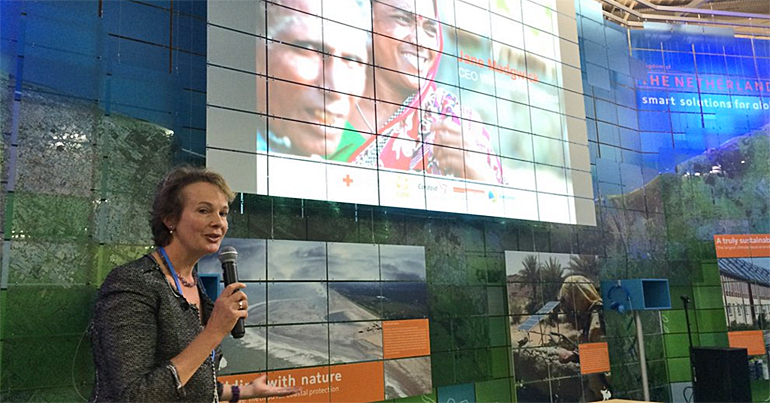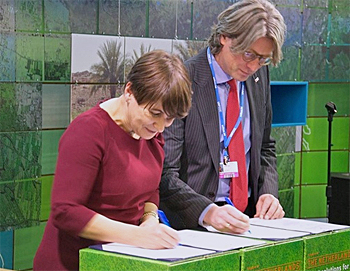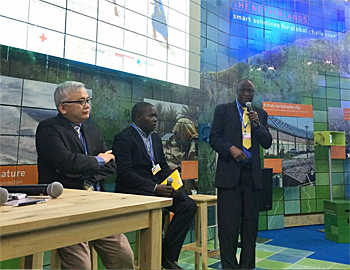COP 21: Netherlands grants 50 million euro to help civil societies in disaster prone areas
 The Dutch government signed an agreement to prologue the government's strategic partnership with five Dutch agencies working to build community resilience in disaster-prone developing countries.
The Dutch government signed an agreement to prologue the government's strategic partnership with five Dutch agencies working to build community resilience in disaster-prone developing countries.
The Dutch government grants 50 million euro for Partners for Resilience to continue its work in Ethiopia, Guatemala, Haiti, India, Indonesia, Kenya, Mali, Philippines, South Sudan and Uganda.
The signing ceremony took place in the Dutch pavilion at the climate summit COP21 in Paris, France on 2 December.
The programme of Partners for Resilience reflects UN Secretary General Ban Ki Moon’s A2R initiative for accelerated resilience and climate adaptation.
The Dutch non-governmental agencies include Netherlands Red Cross, the Red Cross Red Crescent Climate Centre, Wetlands International, Cordaid and CARE Netherlands.
 Official signing by minister Lilianne Ploumen (left) and Juriaan Lahr of Partners for Resilience at the climate summit COP21 in Paris.
Official signing by minister Lilianne Ploumen (left) and Juriaan Lahr of Partners for Resilience at the climate summit COP21 in Paris.
Resilience to natural hazards
They focus on the role of ecosystems in disaster risk reduction and the wider landscape, including river basins, as well as managing changing extremes and rising uncertainties in a changing climate.
An essential element of the partnership is bringing information about local risks and local solutions into planning processes and investment decisions at the national, regional and international level.
Risk-based water management schemes
"For example, there is a need to ensure that large water and coastal-zone management schemes, including infrastructure, become more risk-informed", said Climate Centre Director Maarten van Aalst of the Climate centre on the occasion. "Such risk-informed schemes should adhere to environmental requirements, and consider the needs of all stakeholders, including communities downstream".
"Equally, it’s also about enhancing early warning systems, making the best use of climate information across timescales, and ensuring that such warnings are followed by early action on the ground, rather than waiting for disasters to happen", Van Aalst added.
Chief executive officer Jane Madgwick (on top photo) of Wetlands International mentioned the double role of eco-based solutions, like wetlands, in the climate debate. They address both climate mitigation as well as climate adaptation.
Restoration of coastal mangrove forests for instance, does not only help to reduce CO2 levels, but such forests also act as flood defences.
 Accelerating resilience and climate adaptation
Accelerating resilience and climate adaptation
On the opening day of the climate summit COP21, UN secretary-general Ban Ki-Moon launched the new initiative Anticipate, absorb and reshape (A2R). The initiative must strengthen the ability of countries to anticipate hazards, absorb shocks, and reshape development to reduce climate risks.
It is expected to help address the needs of the nearly 634 million people who live in at-risk coastal areas just a few meters above existing sea levels, as well as those living in areas at risk of droughts and floods.
The world is now experiencing a strong El Niño event, which could place as many as 4.7 million people at risk from drought in the Pacific alone.
Over the next five years, the A2R initiative is set to mobilize financing and knowledge, create and operationalize partnerships at scale, help coordinate activities to help reach tangible results, catalyse research, and develop new tools.
This news item was originally published on the website of Wetlands International.
Read also on this website
• WCDRR 2015: Partners for resilience puts communities in front seat of smart DRR, 15 March 2015
More information
Partners for Resilience
www.partnersforresilience.nl



